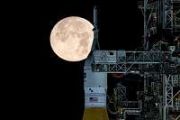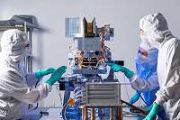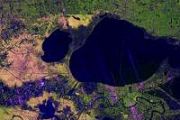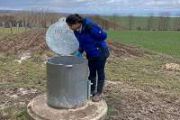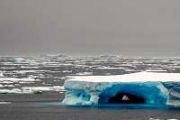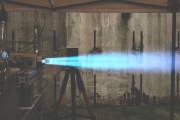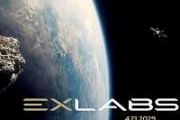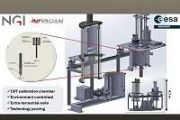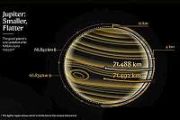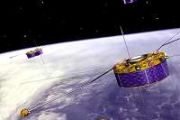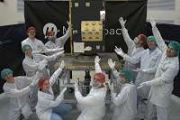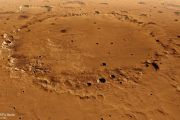
Copernical Team
An eight-hour year
 As far as extrasolar planets go, 'GJ 367 b' is a featherweight. With half the mass of Earth, the newly discovered planet is one of the lightest among the nearly 5000 exoplanets known today. It takes the extrasolar planet approximately eight hours to orbit its parent star. With a diameter of just over 9000 kilometres, GJ 367 b is slightly larger than Mars.
The planetary system is located ju
As far as extrasolar planets go, 'GJ 367 b' is a featherweight. With half the mass of Earth, the newly discovered planet is one of the lightest among the nearly 5000 exoplanets known today. It takes the extrasolar planet approximately eight hours to orbit its parent star. With a diameter of just over 9000 kilometres, GJ 367 b is slightly larger than Mars.
The planetary system is located ju Bolstering planetary biosecurity in an era of space exploration
 The search of life beyond our world is an exciting venture that may yield an enormous discovery in the not-too-distant future. However, space agencies around the world, including NASA and the European Space Agency, have long been aware of the potential risks of biological contamination and have set in place planetary protection policies. In the face of increasing space missions, including those
The search of life beyond our world is an exciting venture that may yield an enormous discovery in the not-too-distant future. However, space agencies around the world, including NASA and the European Space Agency, have long been aware of the potential risks of biological contamination and have set in place planetary protection policies. In the face of increasing space missions, including those Sols 3314-3315: Bountiful, Beautiful Boulders!
 The engineers at JPL responsible for driving Curiosity yet again delivered a perfect drive to some boulders that the science team have been interested in investigating. The large boulders are thought to represent the darker, resistant rocks exposed just above us that cap the underlying less resistant, lighter coloured rocks we have been driving over.
The caprocks and boulders both show t
The engineers at JPL responsible for driving Curiosity yet again delivered a perfect drive to some boulders that the science team have been interested in investigating. The large boulders are thought to represent the darker, resistant rocks exposed just above us that cap the underlying less resistant, lighter coloured rocks we have been driving over.
The caprocks and boulders both show t Nanoracks led team want to build a commercial space station
 Nanoracks, in collaboration with Voyager Space and Lockheed Martin, has been awarded a $160 million contract by NASA to design its Starlab commercial space station as part of the agency's Commercial Low-Earth Orbit (LEO) Development program. Starlab will enable NASA's initiative to stimulate the commercial space economy and provide science and crew capabilities prior to the retirement of the Int
Nanoracks, in collaboration with Voyager Space and Lockheed Martin, has been awarded a $160 million contract by NASA to design its Starlab commercial space station as part of the agency's Commercial Low-Earth Orbit (LEO) Development program. Starlab will enable NASA's initiative to stimulate the commercial space economy and provide science and crew capabilities prior to the retirement of the Int NASA selects companies to develop commercial destinations in space
 NASA has signed agreements with three U.S. companies to develop designs of space stations and other commercial destinations in space. The agreements are part of the agency's efforts to enable a robust, American-led commercial economy in low-Earth orbit.
The total estimated award amount for all three funded Space Act Agreements is $415.6 million. The companies that received awards are:
NASA has signed agreements with three U.S. companies to develop designs of space stations and other commercial destinations in space. The agreements are part of the agency's efforts to enable a robust, American-led commercial economy in low-Earth orbit.
The total estimated award amount for all three funded Space Act Agreements is $415.6 million. The companies that received awards are: NASA awards $415 mn to fund three commercial space stations
 NASA on Thursday awarded three companies hundreds of millions of dollars to develop commercial space stations it hopes will eventually replace the International Space Station, which is due to retire around the end of the decade.
Jeff Bezos' Blue Origin, aerospace company Nanoracks, and defense contractor Northrop Grumman won $130 million, $160 million and $125.6 million contracts respectivel
NASA on Thursday awarded three companies hundreds of millions of dollars to develop commercial space stations it hopes will eventually replace the International Space Station, which is due to retire around the end of the decade.
Jeff Bezos' Blue Origin, aerospace company Nanoracks, and defense contractor Northrop Grumman won $130 million, $160 million and $125.6 million contracts respectivel Rocket Lab reveals Neutron launch vehicle's advanced architecture
 Building on Rocket Lab's proven experience developing the Electron launch vehicle, the second most frequently launched U.S. rocket annually since 2019, the advanced 8-ton payload class Neutron launch vehicle is designed to transform space access by delivering reliable and cost-effective launch services for satellite mega-constellations, deep space missions and human spaceflight. During today's l
Building on Rocket Lab's proven experience developing the Electron launch vehicle, the second most frequently launched U.S. rocket annually since 2019, the advanced 8-ton payload class Neutron launch vehicle is designed to transform space access by delivering reliable and cost-effective launch services for satellite mega-constellations, deep space missions and human spaceflight. During today's l Astronauts conclude spacewalk to replace antenna at space station
 Two NASA astronauts successfully wrapped up a spacewalk Thursday to replace a communications antenna faster than expected outside the International Space Station.
The new antenna was installed at around 9:45 a.m. EST, which NASA said was almost 90 minutes ahead of schedule. The pair spent the next few hours performing additional tasks to help prepare for future spacewalks.
The sp
Two NASA astronauts successfully wrapped up a spacewalk Thursday to replace a communications antenna faster than expected outside the International Space Station.
The new antenna was installed at around 9:45 a.m. EST, which NASA said was almost 90 minutes ahead of schedule. The pair spent the next few hours performing additional tasks to help prepare for future spacewalks.
The sp SpaceX successfully launches latest Starlink fleet from Florida
 SpaceX on Thursday launched 48 Starlink spacecraft from Florida as part of its plans to develop a second generation of communications satellites.
The Falcon 9 rocket successfully lifted off from Complex 40 at Cape Canaveral Space Force Station at about 6:12 p.m. EST.
SpaceX was also able to successfully land the first stage booster for the ninth time, its 89th successful recovery of
SpaceX on Thursday launched 48 Starlink spacecraft from Florida as part of its plans to develop a second generation of communications satellites.
The Falcon 9 rocket successfully lifted off from Complex 40 at Cape Canaveral Space Force Station at about 6:12 p.m. EST.
SpaceX was also able to successfully land the first stage booster for the ninth time, its 89th successful recovery of Northrop Grumman signs NASA to design space station for low earth orbit
 Northrop Grumman has signed a Space Act Agreement with NASA under the Commercial Low-Earth Orbit Development program for $125.6 million to design a safe, reliable and cost-effective commercial free-flying space station in low Earth orbit (LEO). Northrop Grumman's commercial space station design will use current flight systems and advanced crew-focused technology under development that allows for
Northrop Grumman has signed a Space Act Agreement with NASA under the Commercial Low-Earth Orbit Development program for $125.6 million to design a safe, reliable and cost-effective commercial free-flying space station in low Earth orbit (LEO). Northrop Grumman's commercial space station design will use current flight systems and advanced crew-focused technology under development that allows for 
